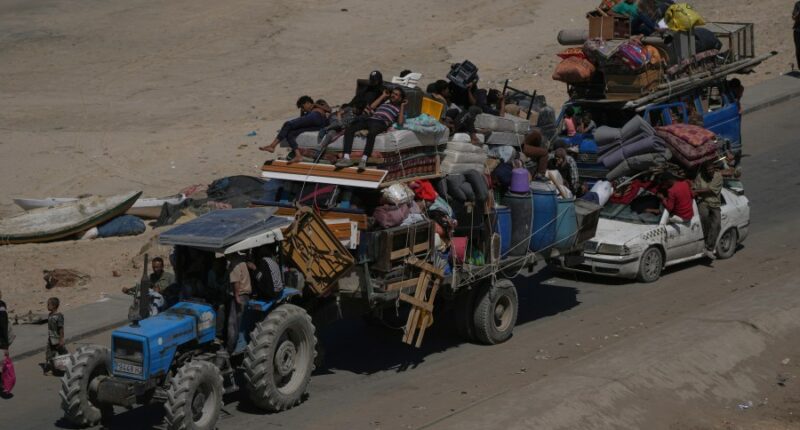Share this @internewscast.com

LONDON (AP) — The U.K. is expected to acknowledge a Palestinian state later Sunday, despite objections from the U.S., based on the belief that Israel hasn’t satisfied conditions related to the Gaza conflict.
While the move is mostly symbolic, the U.K. aims for it to enhance diplomatic efforts to end the Gaza conflict and contribute to establishing a sustainable peace that includes two states coexisting peacefully.
Deputy Prime Minister David Lammy, who was foreign secretary until earlier this month, indicated that Prime Minister Keir Starmer would announce the recognition of a Palestinian state later today.
“Any decision to recognise a Palestinian state, if that were to take place later on today, does not make a Palestinian state happen overnight,” he stated to Sky News.
He implied that such recognition would help sustain the two-state solution’s viability and emphasized that conflating the Palestinian people with Hamas is a misleading narrative.
Road map to recognition
In July, after facing significant pressure within his Labour Party, Prime Minister Keir Starmer expressed that the U.K. would recognize a Palestinian state unless Israel enacted a ceasefire in Gaza, facilitated U.N. aid access, and took steps towards achieving long-term peace.
The anticipated move comes ahead of the U.N. General Assembly this week, where other nations, including Australia, Canada and France, are also readying to recognize a Palestinian state. Portugal is expected to do so later Sunday.
More than 140 countries have already taken the step to recognize a Palestinian state, but the decisions by France and Britain are significant as they are both members of the Group of Seven and the U.N. Security Council.
Not universally popular
The U.K.’s expected recognition of a Palestinian state comes just days after a state visit from U.S. President Donald Trump, during which he voiced his disapproval of the plan.
“I have a disagreement with the prime minister on that score,” Trump said.
Critics, including the U.S. and the Israeli government, which has shown no interest in a two-state solution, have condemned the plans, saying it rewards Hamas and terrorism. As well as arguing that recognition is immoral, critics argue that it’s an empty gesture given that the Palestinian people are divided into two territories — the West Bank and Gaza — with no recognized international capital.
Starmer has insisted that Hamas will have no role in the future of the governance of the Palestinian people and must release the Israeli hostages it still holds from the attacks on Oct. 7, 2023.
Historical overlay
France and the U.K. have a historic role in the politics of the Middle East over the past 100 years, having carved up the region following the defeat of the Ottoman Empire in World War I.
As part of that carve-up, the U.K. became the governing power of what was then Palestine. It was also author of the 1917 Balfour Declaration, which backed the establishment of a “national home for the Jewish people.”
However, the second part of the declaration has been largely neglected over the decades. It noted “that nothing shall be done, nothing which may prejudice the civil and religious rights” of the Palestinian people.
Lammy, who will represent the U.K. at the U.N. this week, said in July that this had not been upheld and represented “a historical injustice which continues to unfold.”
The Palestinian head of mission in the U.K. Husam Zomlot told the BBC that recognition would right a colonial-era wrong.
“The issue today is ending the denial of our existence that started 108 years ago, in 1917,” he said. “And I think today, the British people should celebrate a day when history is being corrected, when wrongs are being righted, when recognition of the wrongs of the past are beginning to be corrected.”
Change of tack
The U.K. has for decades supported an independent Palestinian state alongside Israel, but insisted recognition must come as part of a peace plan to achieve a two-state solution.
However, the government has become increasingly worried that such a solution is becoming all but impossible – not only because of the razing of Gaza and displacement of most of its population during nearly two years of conflict, but because Israel’s government is aggressively expanding settlements in the West Bank, land Palestinians want for their future state. Much of the world regards Israel’s occupation of the West Bank, which is ostensibly run by the Palestinian Authority, as illegal.
“We are working to reform the Palestinian Authority, and we have to keep two states alive for the children of both Gaza and the West Bank and East Jerusalem,” said Lammy.












